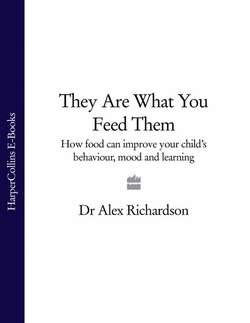Читать книгу They Are What You Feed Them: How Food Can Improve Your Child’s Behaviour, Mood and Learning - Dr Richardson Alex - Страница 28
The Specialists
ОглавлениеDo the specialists advising you know anything about food and diet, and its potential effects on brains and behaviour? Sadly, unlike vets, most doctors in the UK and other Western countries still receive very little training in nutrition and its implications for health. They do learn about the basic ‘deficiency diseases’ (such as scurvy, pellagra or rickets) and there is now an increasing focus on ‘preventative medicine’—which usually includes at least some attention to nutrition and diet. But even though good nutrition is essentially about the body’s biochemistry, medical training usually puts far more emphasis on the way in which drugs can be used to manipulate this. Synthetic drugs can be patented for profit. With some rare exceptions, naturally occurring nutrients can’t.
It’s rather ironic that veterinary training involves far more emphasis on nutrition and health than does ordinary medicine—probably because the economic factors surrounding animal health are rather different. When farm animals get sick, for example, dietary considerations and possible nutrient deficiencies or imbalances are usually one of the main factors considered. That said, vets’ patients don’t usually attend their appointments demanding a course of pills that will make them better! We would do well to learn from this.
What other specialists might you and your child see? Clinical psychologists, occupational therapists, education professionals, and those working in social services or related fields receive little or no formal training in how food and diet can affect behaviour and mental health. For this reason these professionals can often be very sceptical about dietary issues, even when parents try to raise these.
Good nutrition is the essential foundation for health—and poor nutrition is guaranteed to lead to ill-health of one kind or another, sooner or later. This is as true for the brain as it is for the body. Unhealthy children generally do not feel well, do not behave well, do not learn well, and—surprise, surprise—do not perform well.
The same goes for unhealthy parents, so I do want to emphasize that this book is written for you, not just for your child. It also applies, of course, to unhealthy teachers, unhealthy doctors, unhealthy social workers or any other unhealthy people whose opinions and decisions are important to your child’s welfare! You may already have met some of these.
You may want to look at what the statistics say about health, life expectancy and job satisfaction among members of our education, health, social service and criminal justice systems. Most of the sad facts are easily explicable in terms of the conditions and the culture in which these professionals are expected to work, the ever-increasing targets they are supposed to meet, the training and resources with which they are provided, and the systems and people that govern them. Most of them know very little about nutrition, as I have pointed out already. Those that do are not usually encouraged (or even allowed) to use that knowledge in their work…
